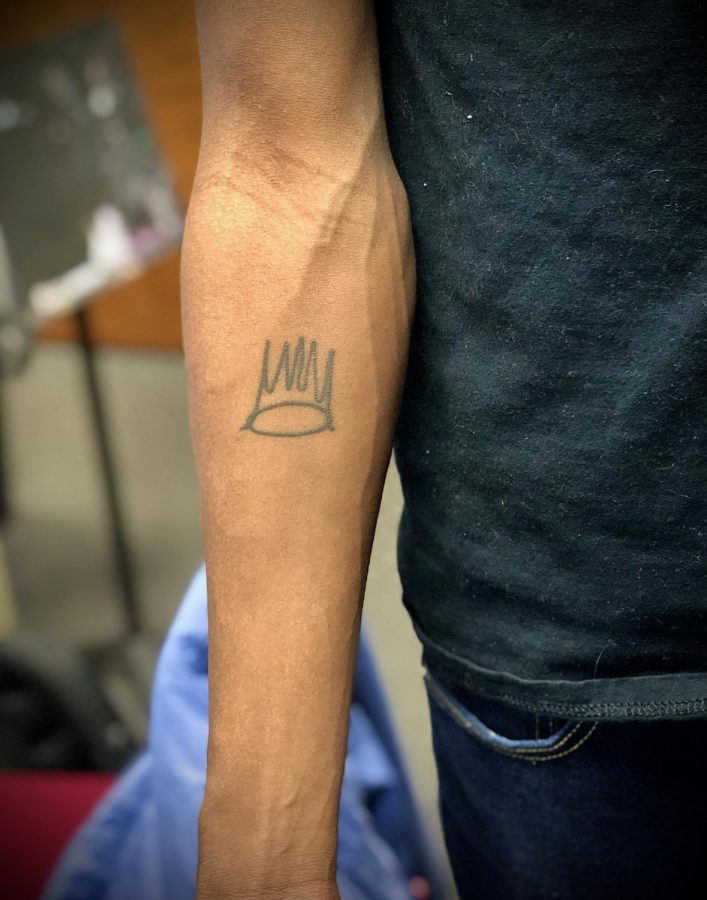Proud and Unapologetic, Seniors Share their Unique Experiences with Tattoos
“What are you going to get?” Yannick’s father asked him as they pulled into the parking lot of a Cuban tattoo parlor. He racked his brain. What should he say? What did he feel comfortable having on his body permanently? “I couldn’t imagine I was actually getting a tattoo,” Yannick remembers. “I was so young. It didn’t quite feel real.”
At fifteen, Yannick Haynes ‘20 went on a life changing vacation with his family to Cuba. During the trip, Yannick’s parents suggested the family get tattoos. After some deliberation and brainstorming, he found himself in Alejandro’s tattoo shop, a local parlor off the beaten path. He was excited but nervous. Again, his father asked him, “What are you going to get?” Yannick still didn’t have an answer.
“At first, I told them I felt uncomfortable,” Yannick says. “I’m an actor. I was always told that, as an actor, I’m not supposed to have ink on my body, and it would affect my career.” Despite the warning, Yannick’s interests were piqued. He had always wanted a tattoo, and he saw this as the perfect opportunity. He had to get one.
As Alejandro began tattooing the other members of his family, an idea came into Yannick’s mind. “Suddenly, I know what I’m going to get… the J Cole crown from the album Born Sinner.”
It was a quick decision, but Yannick felt confident in what he wanted. To him, the crown represented something personal: “I’m someone who’s really hard on myself. I hate making mistakes, and I hate admitting when I’ve made them. The tattoo and the album remind me that we all mess up. Everyone has flaws, and It’s a natural part of life to be wrong.”
Yannick left Cuba transformed. He was a “new man” with a new tattoo, and he felt on top of the world. However, this elation ended abruptly. When Yannick returned home, most of his classmates were suspicious of his tattoo. No one could believe Yannick’s parents had agreed to it. He was only 15. It seemed impossible.
At school, Yannick was asked about his tattoo constantly. Students and teachers alike were interested, and reasonably so; It’s not every day you see a 15-year-old with a tattoo on their forearm. They wanted to know what it was, if it was real, how he had gotten it. While Yannick didn’t mind giving explanations to a certain extent, there were instances in which the questions went too far. “People were really on edge,” Yannick says. “There were kids and adults who were just in disbelief. They questioned my parents’ judgment, and I had to keep re-explaining the story.”
What Yannick found most irritating was when classmates would misrepresent his tattoo. “They would say it was an upside-down basketball net or something like that. They weren’t trying to be mean, but it kind of upset me.” Quickly, the message that was so personal to him was being twisted into something else by someone else. It felt wrong. Yannick was so happy with his tattoo. Why couldn’t others just allow him that peace of mind?
Simply put, Yannick and his experience in Cuba were thought of as an anomaly. Currently, all U.S states require a person to be at least 18 years of age to get a tattoo without parental permission. For this reason, many think that it’s unusual for teenagers to have tattoos. This is a false conclusion. A 2017 report from the American Academy of Pediatrics using specific data from a Texas Tech study estimates that 10% of American high school students have tattoos. In FSS terms, this means that the 12th grade would likely include 5 tattooed students.
Clearly, minors are getting tattoos. Most, like Yannick, are doing it legally. The process is fairly simple. If a teen wants a one, they must convince their parents, gain their official permission, and then they’re good to go. Easy, right? Not so much.
According to a national poll done by the University of Michigan in 2018, 78% of parents with children between the ages of 13 and 18 said they would absolutely not consider allowing their adolescent to get a tattoo. Their reasoning spanned from concerns about infections from equipment to judgment their child may receive from a future employer.
Not everyone is as lucky as Yannick when it comes to support from their parents on the issue of tattoos. Poli Sotnik-Platt ‘20 says her parents were “completely against the idea from the beginning.” As an artist, she had always imagined herself getting tattoos but thought that without her parent’s approval, she’d be out of luck until she turned eighteen. Then, she found “Stick and Poke.”
For minors who are unable to acquire parental permission and are willing to bend the rules, Stick and Poke is a popular alternative to the traditional method. For those unfamiliar with the process, creating one of these homemade tattoos requires repeatedly puncturing the skin with a needle dipped in ink. It can be slow and painful, but Poli says “it’s really not that bad” and is an avid supporter of the art form. “I know some people think that Stick and Poke tattoos are ugly, but I like them. I think it adds character to a tattoo.”
She got her first Stick and Poke this summer. “It was all impulse that day,” she says. “We were sitting on the porch. My parents had just left, and my friend was preparing everything and hardcore pressuring me into it. I wanted one, of course, but I wasn’t really set on what.”
In the end, Poli gave in, and her friend began the grueling process of poking the ink into her skin. Other than some pain, things were going great. She was settling in and starting to like the design when all of a sudden her mom came back. “I can’t even describe the look on my mom’s face when she saw us,” she says. “I was frozen, a needle sticking out of my arm, and she was horrified. It was not the way I wanted to break the news to her.”
Despite the resulting arguments and awkwardness with her parents, Poli says she does not and will not regret the experience: “I don’t care what people say. I’m madly in love with my tattoo.”
Like Yannick, Poli agrees that having a tattoo has led to unwelcoming behavior towards her. She feels adults, including her parents, often pass unwarranted judgment on her and ask disrespectful questions. While it doesn’t bother Poli so much anymore, she has come to believe that this attitude is most likely to do a form of ageism. “They think we’re just dumb kids, and we’re going to regret these decisions later,” she says. “It’s not fair.”
Other seniors concur that adults believe that as teenagers, they are more likely to make regretful choices. Sophie Olah 20’ desperately wants a tattoo. However, her parents won’t allow it, and her whole family has laughed at the idea. She recalls a family gathering in which her uncle came up to her and asked about her interest in body art: “What will happen when you get older and meet a nice man? He won’t love you if you have ink on [your] skin.”
“I was hurt,” Sophie says. “I didn’t know what to say. The adults I talk to tend to think tattoos are an in the moment kind of thing, and that in a year or so I won’t want them anymore, but I’ve wanted them forever. I just don’t think they’ll ever understand.”
So, is there any validity in the claim that these teens are going to regret their tattoos? Yannick says no. Last year, he got another tattoo to commemorate his first-ever production, A Raisin in the Sun. He thinks, “My tattoos are like artwork. They’re an extension of me.” He hopes to fill his body with this kind of art.
Poli also says no: “For me, getting tattoos is about independence, expression, and your relationship with your body. It’s empowering and beautiful.” She has plans for both more Stick and Poke and professional tattoos in the future.
Even the data says no. Another poll included in the American Academy of Pediatrics’s 2017 report noted that of responders, including adolescents, only 14% said that they regretted their tattoos. Despite what some may think, age does not damage one’s ability to make sound decisions. Ignorance does. When a teenager approaches getting a tattoo with reason and practicality, they run the same risk of any other person: a 14% chance they’ll regret it.
In the end, some people just don’t like tattoos whether they’re on a teenager, an adult, or a senior citizens. In a 2014 national Fox News poll, a recorded 58% of voters responded “no” when asked if they liked tattoos. 60% said that tattoos make a person less attractive. Those people are entitled to that opinion. Humans have preferences. It’s natural.
Yannick and Poli are strong in their beliefs. Whether they come to regret their tattoos in the future or not, for now, they are proud of their bodies and unapologetic for them; they recommend that those with an interest in body art should engage in their self-expression. “It doesn’t matter how old you are,” Poli says. “If you want a tattoo, get one. Be creative. Show the world who you are!”
Work Cited
Armstrong, Myrna L., and Kathleen Pace Murphy. “Tattooing: Another Adolescent Risk Behavior Warranting Health Education.” Applied Nursing Research, W.B. Saunders, 13 Dec. 2004, https://www.sciencedirect.com/science/article/pii/S0897189797805605.
Blanton, Dana. “Fox News Poll: Tattoos Aren’t Just for Rebels Anymore.” Fox News, FOX News Network, 23 Dec. 2014, https://www.foxnews.com/us/fox-news-poll-tattoos-arent-just-for-rebels-anymore.
Breuner, Cora C., and David A. Levine. “Adolescent and Young Adult Tattooing, Piercing, and Scarification.” American Academy of Pediatrics, American Academy of Pediatrics, 1 Oct. 2017, https://pediatrics.aappublications.org/content/early/2017/09/14/peds.2017-1962#ref-7.
“Tensions over Teen Tattoos.” National Poll on Children’s Health, https://mottpoll.org/reports/tensions-over-teen-tattoos.
























Sandra Kirkpatrick • Dec 14, 2019 at 9:36 AM
Great article, and research. New points of view on this topic.
Lisa Nelson-Haynes • Dec 12, 2019 at 6:20 PM
Great article! As one of Yannick’s parents, I’d like to add my two cents. I completely understand parents reticence in allowing their children to get tattoos, it’s really a judgement call. I have several tattoos, as does my husband and Yannick’s older sister. Prior to allowing our children to get them, we discussed a few issues, including how the images will remain with them forever and the importance of identifying the narrative behind the selective image. For the Haynes tribe, our tats are simply another form of self-expression.